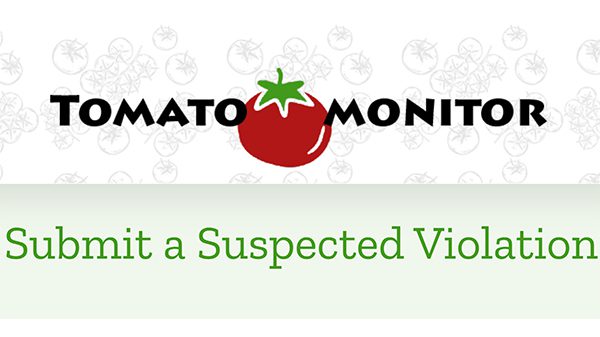
PRESS RELEASE: Maitland, FL, October 19, 2020 – The Florida Tomato Exchange BB #:162441 recently launched TomatoMonitor.com, which allows individuals and companies in the tomato trade to report suspected violations of the Tomato Suspension Agreement. The new website is an important tool for the industry to self-monitor the agreement between Mexican fresh tomato producers and the U.S. Government.
“The key to any agreement is enforcement,” stated Michael Schadler, Executive Vice President of the Florida Tomato Exchange. “The new Suspension Agreement is more enforceable than the previous agreements, but we know there are still ways to cheat. Any circumvention of the Suspension Agreement hurts the market for everyone so we hope this website will be an additional deterrent against cheating.”
Reporting violations on TomatoMonitor.com takes just a few minutes and submissions can be made anonymously if one so chooses. The website will ask users a short series of questions to compile all relevant and available details. Submissions will be reviewed by FTE staff, but won’t be shared with member companies of the FTE. Any information deemed credible will be forwarded to the U.S. Department of Commerce with a request to be treated under an Administrative Protective Order so that it will not be made public.
Circumvention of the Suspension Agreement isn’t just about selling below the established reference prices. For example, selling agents and buyers need to be aware of the rules governing price adjustments on Mexican tomatoes following a USDA destination inspection. Selling agents and buyers also need to remember that violations of the Suspension Agreement may constitute an unfair trade practice that violates PACA.
“When tomato markets are oversupplied and prices are low, the Suspension Agreement rules actually help the market return to a healthy equilibrium,” said Schadler. “Circumvention of the agreement prolongs low market prices and allows unscrupulous buyers and sellers to take advantage of the vast majority of companies who play by the rules.”
###
The member companies of the Florida Tomato Exchange produce over 90 percent of the tomatoes grown in Florida and are among the largest producers of tomatoes in California, Georgia, South Carolina, Virginia, Tennessee, New Jersey, and Puerto Rico. FTE member companies produce approximately 50 percent of the fresh-market tomatoes grown in the U.S. The FTE is the domestic petitioner in the antidumping case against fresh tomatoes from Mexico.
FTE Contact:
Michael Schadler, Executive Vice President
407-660-1949 | michael@floridatomatoes.org
PRESS RELEASE: Maitland, FL, October 19, 2020 – The Florida Tomato Exchange BB #:162441 recently launched TomatoMonitor.com, which allows individuals and companies in the tomato trade to report suspected violations of the Tomato Suspension Agreement. The new website is an important tool for the industry to self-monitor the agreement between Mexican fresh tomato producers and the U.S. Government.
“The key to any agreement is enforcement,” stated Michael Schadler, Executive Vice President of the Florida Tomato Exchange. “The new Suspension Agreement is more enforceable than the previous agreements, but we know there are still ways to cheat. Any circumvention of the Suspension Agreement hurts the market for everyone so we hope this website will be an additional deterrent against cheating.”
Reporting violations on TomatoMonitor.com takes just a few minutes and submissions can be made anonymously if one so chooses. The website will ask users a short series of questions to compile all relevant and available details. Submissions will be reviewed by FTE staff, but won’t be shared with member companies of the FTE. Any information deemed credible will be forwarded to the U.S. Department of Commerce with a request to be treated under an Administrative Protective Order so that it will not be made public.
Circumvention of the Suspension Agreement isn’t just about selling below the established reference prices. For example, selling agents and buyers need to be aware of the rules governing price adjustments on Mexican tomatoes following a USDA destination inspection. Selling agents and buyers also need to remember that violations of the Suspension Agreement may constitute an unfair trade practice that violates PACA.
“When tomato markets are oversupplied and prices are low, the Suspension Agreement rules actually help the market return to a healthy equilibrium,” said Schadler. “Circumvention of the agreement prolongs low market prices and allows unscrupulous buyers and sellers to take advantage of the vast majority of companies who play by the rules.”
###
The member companies of the Florida Tomato Exchange produce over 90 percent of the tomatoes grown in Florida and are among the largest producers of tomatoes in California, Georgia, South Carolina, Virginia, Tennessee, New Jersey, and Puerto Rico. FTE member companies produce approximately 50 percent of the fresh-market tomatoes grown in the U.S. The FTE is the domestic petitioner in the antidumping case against fresh tomatoes from Mexico.
FTE Contact:
Michael Schadler, Executive Vice President
407-660-1949 | michael@floridatomatoes.org



